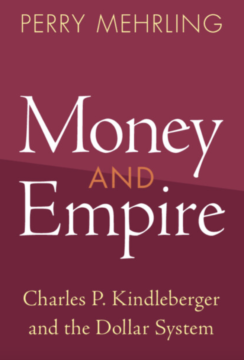 Herman Mark Schwartz in Phenomenal World:
Herman Mark Schwartz in Phenomenal World:
Money makes the world go round, or as Karl Marx put it, Geldgespräche, Quatsch-Spaziergänge. How does this work at the global or international level? Perry Mehrling’s elegantly written biography of the MIT economist Charles Poor Kindleberger illuminates the relationship between money and the global structure of economic and political power. Kindleberger, a distinguished economic historian, was in many ways, and to his own surprise, a central and founding figure in the political science subfield of International Political Economy (IPE). Breaking with the emerging abstract economic models of his time, he developed an empirical and practical approach that emphasized the importance of the political infrastructure underpinning global financial markets, and the ever present possibility of crisis. Lurking in the background of this biographical narrative is a greater story about empire, left whispering in the softest possible voice—a Straussian sotto voce.
Servant of empire?
Empires run on money. In durable empires, that money pays bureaucrats who run the empire, so empires need people as well. Kindelberger’s early life trajectory was well suited to the bureaucratic needs of the mid-twentieth century American empire. As Mehrling repeatedly notes, Kindleberger was a WASP through and through. WASPs—White Anglo-Saxon Protestants—were the original ethnonational core of the Thirteen Colonies, in a definition that expanded enough to encompass the initially “foreign” German and Dutch settlements in the mid-Atlantic colonies but never enough to include the subsequent wave of immigrant Irish Catholics, let alone enslaved Africans.
More here.
